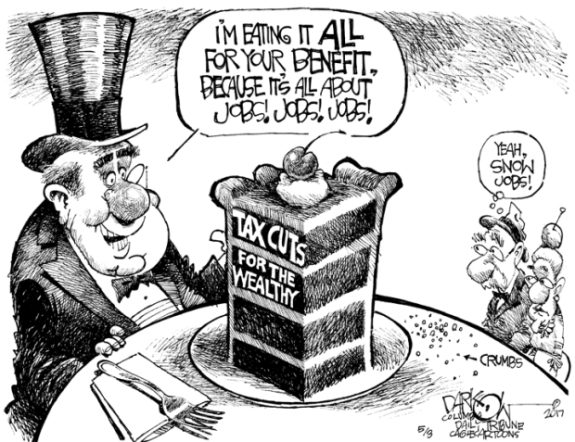How are you going to pay for it?

The Coalition stakes a lot on the perception of them as better managers of the economy. In the past, they have relied on ‘debt and deficit disaster’ rhetoric with promises of surpluses. That’s out for the foreseeable future.
They are now spruiking a low unemployment rate without ever acknowledging the impact that no foreign workers may have had on that. Nor do they ever speak of the precarious nature of employment and stagnant wages. They speak proudly of growth in GDP, not admitting that government spending (read debt) is driving it, and glossing over the increasing cost of living that inflation brings.
Another tactic they persistently use to undermine Labor policies is asking how much they will cost and how are they going to pay for them.
At the last election, Labor had excellent policies for taxation reform that a misinformed electorate rejected. It was too much for people to comprehend and, as such, was easily weaponised with the old adage about Labor will tax you more even though what they were mainly doing was closing loopholes and distortions thrust on us by the profligate Howard government.
The Coalition were able to get away with asking how much action on climate change would cost while never answering how much inaction would cost.
Well this time around, Labor could have an easy answer to how they will pay for policies whilst reducing debt if they are brave enough to use it – delay/abandon the stage 3 tax cuts.
The cuts, set to come into effect in 2024, apply a standard 30 per cent income tax rate to those who earn between $45,000 and $200,000 a year.
The reason given for this is to reverse bracket creep – where a pay rise puts an individual’s income over the threshold for the next tax bracket. (It should be stressed that the higher rate only applies to the excess over that threshold, not your whole income.)
The only way to truly eliminate bracket creep is to make annual adjustments to the thresholds as explained by a very interesting paper from the Parliamentary Budget Office, Bracket creep and its fiscal impact, released in September last year.
“In the absence of the Stage 3 tax cuts, bracket creep over the next decade would be projected to reduce net debt in 2031‑32 by $276 billion.”
What the government is proposing is “projected to add around $197 billion to net debt in 2031‑32.”
That’s a $473 billion difference in net debt, and it doesn’t keep up with bracket creep anyway.
“The impact of the Stage 3 tax cuts will be more than offset by bracket creep by 2031-32. In that year, the tax cuts are estimated to cost just over $30 billion, while bracket creep is projected to have added $57 billion in additional revenue.”
Research by The Australia Institute shows the benefit from the cuts would predominantly go to high income earners.
“In 2024-25, when stage 3(a) first comes into effect, almost a third of the benefit goes to the top 10 per cent of taxpayers and the top 20 per cent will get more than half of the benefit. At the other end of the distribution the bottom 10 per cent gets none of the benefit while the bottom 20 per cent gets less than one per cent of the benefit.”
As most women are middle to low income earners, these cuts disproportionately favour men according to analysis prepared by the parliamentary budget office for the Greens.
“Men will receive about $2 for every $1 women receive between 2024 and 2031 under the tax plan, receiving a total of an extra $121.7bn compared with $62.4bn for women over the period.”
The wealthy have already been doing quite well out of the pandemic with property and share prices ballooning. Low interest rates and government stimulus have made an ideal environment for those able to take advantage.
Giving the rich more isn’t necessary to stimulate an economy with low unemployment and growth in the target range.
Lifting the tax-free threshold would have a far more beneficial flow-on effect giving assistance where it is most needed, knowing it will be spent, and saving more people from having to fill in a tax return for the ATO to process.
Governments face a trade-off between returning bracket creep and allowing bracket creep to reduce debt faster.
With December’s MYEFO projecting net debt will peak in 2025 at $915 billion, it would be fiscally responsible for Labor to say now is not the time for this tax cut, which would then put their second term budget in far better shape than the Coalition’s.
As the Coalition goes to an election promising to spend hundreds of billions on obsolete and inappropriate armaments and hundreds more on tax cuts for the wealthy, perhaps it’s time to ask them about everything else they promise…
How are you going to pay for it?
Like what we do at The AIMN?
You’ll like it even more knowing that your donation will help us to keep up the good fight.
Chuck in a few bucks and see just how far it goes!
Your contribution to help with the running costs of this site will be gratefully accepted.
You can donate through PayPal or credit card via the button below, or donate via bank transfer: BSB: 062500; A/c no: 10495969